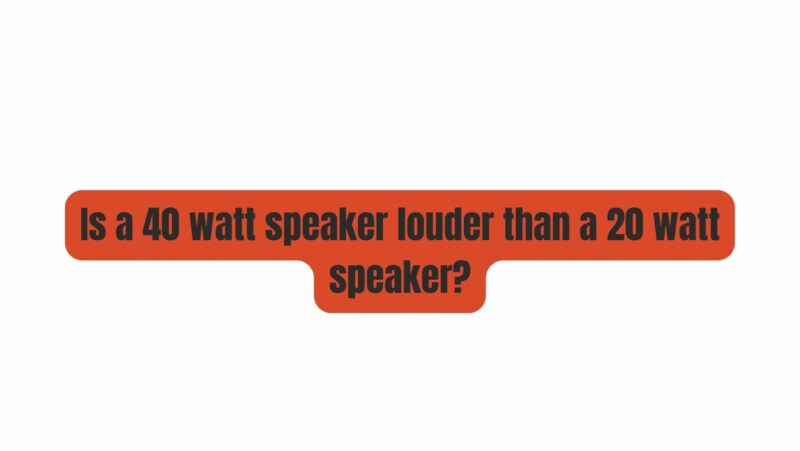In the world of audio equipment, understanding the connection between wattage and loudness is essential for making informed choices. One common question that arises is whether a 40-watt speaker is inherently louder than a 20-watt speaker. In this comprehensive guide, we will delve into the intricacies of speaker wattage, its influence on loudness, and the various factors that determine which speaker might sound louder in different scenarios.
1. The Role of Speaker Wattage
To begin our exploration, let’s clarify the fundamental role of speaker wattage. Speaker wattage refers to the amount of electrical power a speaker can handle and convert into sound. It is a critical specification that significantly affects a speaker’s performance, including its ability to produce sound at different volume levels.
2. Speaker Wattage vs. Loudness
While speaker wattage plays a crucial role in determining loudness, it is not the sole determinant. The perceived volume of a speaker depends on a combination of factors, and understanding this interplay is essential to assess whether a 40-watt speaker is truly louder than a 20-watt speaker.
3. Speaker Sensitivity: The Efficiency Factor
Speaker sensitivity, typically measured in decibels (dB), is a key factor in loudness. It indicates how efficiently a speaker converts electrical power into sound. High-sensitivity speakers can produce higher volume levels with less wattage, while low-sensitivity speakers require more power to achieve the same loudness. We’ll explore how speaker sensitivity impacts the perceived volume.
4. Room Size and Acoustics
The environment in which you place your speakers plays a significant role in loudness. Factors like room size, room acoustics (reflective and absorptive surfaces), and speaker placement can amplify or diminish the apparent volume of a speaker. We’ll discuss how room size and acoustics influence loudness and why they should be considered.
5. Amplifier Power and Compatibility
To optimize loudness, it’s crucial to match a speaker with an amplifier that can deliver the required power. Mismatched amplifiers can limit a speaker’s ability to play loudly, potentially leading to distortion or damage. We’ll emphasize the importance of amplifier compatibility and its impact on loudness.
6. Peak Power vs. RMS Power
Distinguishing between peak power and RMS (root mean square) power ratings is essential in understanding how wattage relates to loudness. Peak power represents the maximum short-term power a speaker can handle, while RMS power indicates the continuous power it can sustain without damage. We’ll clarify the significance of these specifications in the context of loudness.
7. Real-World Scenarios
To provide practical context, we’ll explore real-world scenarios where speaker wattage affects loudness differently. Whether it’s for a home audio setup, live performances, or outdoor events, we’ll delve into how various situations may require different wattage levels to achieve the desired perceived loudness.
8. The Balance Between Wattage and Loudness
In conclusion, the question of whether a 40-watt speaker is louder than a 20-watt speaker involves a nuanced understanding of speaker wattage, sensitivity, room characteristics, amplifier compatibility, and the specific listening environment. It is not as straightforward as comparing wattage ratings alone.
By considering these factors and their interplay, consumers and audio enthusiasts can make informed decisions when selecting speakers. Loudness is not just about raw power; it’s about optimizing all the variables to create an immersive auditory experience tailored to individual preferences and needs. Understanding the complexities of loudness empowers individuals to choose speakers that deliver the right volume while ensuring an enjoyable and high-quality sound experience.


